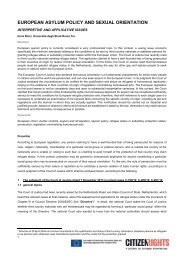AEMI
AEMI-2016-web
AEMI-2016-web
Create successful ePaper yourself
Turn your PDF publications into a flip-book with our unique Google optimized e-Paper software.
138 <strong>AEMI</strong> JOURNAL 2015<br />
In contrast to the promoters’ view<br />
about the positive impact of ICA, the<br />
abolitionists have focused on the negative<br />
impact because they stress that it is<br />
a product of neo-colonialism and ethnocentrism.<br />
Children are being adopted<br />
from poor states for the need of people<br />
in rich, powerful states. In addition, abolitionists<br />
argue that if the money spent<br />
on adopted children would be spent on<br />
children’s services in the sending countries,<br />
the lives of many children could be<br />
improved. Abolitionists are in particular<br />
concerned about whether abuse is increasing<br />
to meet the demand for children,<br />
and that ‘accepted practices such<br />
as requiring donations to orphanages,<br />
can easily develop into corruption, possibly<br />
even the selling of children’ (Ibid.:<br />
149).<br />
Pragmatists accept ICA because they<br />
believe it can be controlled. It is controllable<br />
by a range of unilateral, bilateral<br />
and international measures and<br />
statements, the Hague Convention in<br />
particular. According to pragmatists,<br />
legislative action alone is not enough because<br />
it will not raise standards. Therefore,<br />
‘new practices will have to displace<br />
existing ones, challenge the beliefs of applicants,<br />
agencies, the judiciary of and<br />
immigration services, and focus on the<br />
attention of governments’ (Ibid.: 150).<br />
Consumption patterns are also being<br />
altered by globalization. The world has<br />
become a consumer society where desires<br />
and tastes have become essential parts of<br />
our lives. The ICA system also satisfies<br />
desires and tastes. An overwhelming<br />
preference for children of a certain age,<br />
sex, and ethnicity exists (Graff, 2008;<br />
Goodwin, 2010; Kapstein, 2003; Meier,<br />
2008; Zamostny et al., 2003). As Herrmann<br />
notes, the ICA process is seen<br />
‘as “shopping” for a child, with parents<br />
selectively seeking a child that best fits<br />
their personal needs’(2010, 414).<br />
In short, the ICA market is strongly<br />
related to the outcomes of globalization.<br />
It has become a global practice<br />
where in discussions three positions<br />
are present (promoters, abolitionists<br />
and pragmatists). A preference<br />
for particular children is a market element<br />
because it involves valuing and<br />
pricing, as the next section shows.<br />
The Intermediares<br />
In case of a competitive market, there<br />
are many buyers and sellers exchanging<br />
the same goods. ICA is governed by<br />
such a market because the demand of its<br />
customers creates an upward pressure<br />
on the supply. This became evident at a<br />
meeting for prospective adoptive parents<br />
organized by a Dutch agency (Vereniging<br />
Wereldkinderen) we witnessed.1 A<br />
representative explained that the staff<br />
has to be in the office at 1.30 A.M. once<br />
every month, i.e. when the list of adoptable<br />
children in China is being updated.<br />
This list is consulted by adoption<br />
agencies all over the world. Therefore, as<br />
the employee explained, it needs to be<br />
checked immediately. All the children<br />
would otherwise already been placed by<br />
the time the office opens. Thus, the children<br />
are matched to parents by adoption<br />
agencies in a split second, in order<br />
to secure the supply of children and to<br />
complete the mediation between the<br />
parents and the adoption agencies.<br />
Completing the mediation is very<br />
important for adoption agencies. According<br />
to Professor Emeritus of Adoption<br />
Dr. René Hoksbergen 2 , adoption









